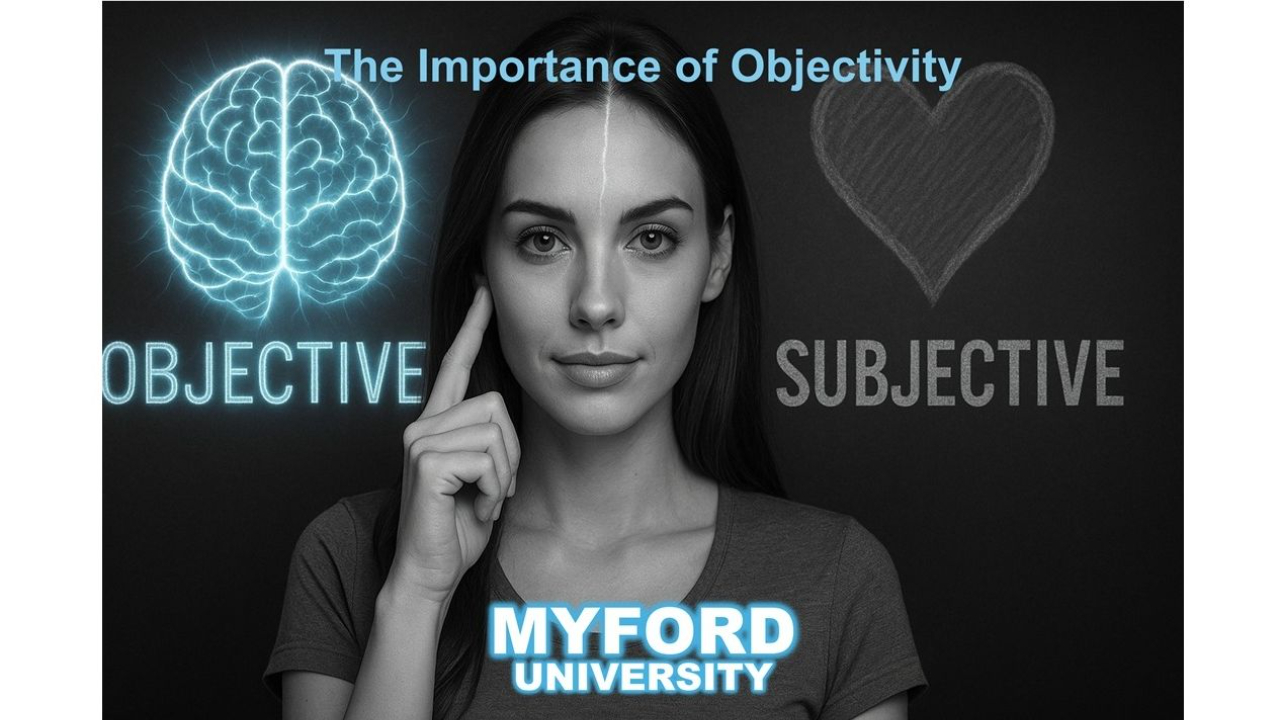The Importance of Objectivity Over Subjectivity
Jul 21, 2025
Introduction: Bias is Human. But Objectivity is Power.
At Myford University, we believe in results. Not wishful thinking. Not inherited assumptions. Not narratives handed down by culture, tradition, or social media echo chambers.
Just results.
And results come from objectivity.
Every one of us walks around with a unique mental model—built from our upbringing, experiences, education, social circles, and even our fears and desires. These models help us make sense of the world, but they also limit us. They create blind spots. They cause us to see what we expect to see, not what’s actually there.
To truly understand something—or make a wise decision—you have to temporarily suspend your subjectivity and lean into the harder path: objectivity. This isn’t easy. It often feels uncomfortable. But it’s how you grow. It’s how you make progress. And it’s how you avoid costly mistakes—both personally and professionally.
Let’s explore why objectivity matters more than ever, and how you can build it into your thinking, decision-making, and everyday actions.
Part I: Understanding Objectivity and Subjectivity
What is Objectivity?
Objectivity is the practice of viewing situations, data, people, and outcomes without being influenced by personal feelings, interpretations, or prejudice. It’s about asking, “What is true?”—not “What do I want to be true?”
It demands that we:
- Follow the evidence wherever it leads
- Accept inconvenient truths
- Stay open to changing our minds
What is Subjectivity?
Subjectivity is the lens through which we all experience the world. It’s shaped by:
- Personal feelings and emotions
- Cultural and social influences
- Past experiences
- Preferences and values
Subjectivity isn’t inherently bad. It makes us human. It colors our art, fuels our relationships, and provides context to our values. But when it dominates our thinking—especially in decision-making—it can lead us astray.
Part II: Why Objectivity Is So Hard (But Necessary)
Here’s the truth: we are wired to be subjective. Our brains like short cuts. We use heuristics, emotions, and assumptions to navigate complexity quickly. That’s useful when crossing a busy street or sizing up a social situation. But in more complex matters—like major life decisions, business strategy, or evaluating new information—subjectivity becomes a liability.
Common obstacles to objectivity include:
- Confirmation bias (we seek out what supports our beliefs)
- Emotional attachment (we become wedded to our past decisions)
- Tribal identity (we value belonging over truth)
- Fear of being wrong (changing your mind can feel like losing)
But here’s the paradox: the most powerful thinkers are those willing to be wrong. Willing to let go. Willing to follow the truth even if it disrupts their current belief system.
Part III: Where Objectivity Matters Most
- Personal Life
Let’s talk real life. Relationships. Health. Major life choices. These are all areas where objectivity can radically improve outcomes—but only if you’re willing to be honest with yourself.
Family Decisions
You may have always assumed your hometown was the best place to raise kids. But what do the crime rates say? The school rankings? The job opportunities? Objectivity asks you to look beyond nostalgia and make a decision based on what’s best now, not what used to be true.
Where You Live
Is your current city aligned with your values, goals, and needs—or are you just there out of habit? Objectivity encourages you to take stock. To run the numbers. To ask if there’s a better place that fits the next chapter of your life.
Foods You Eat
Are you eating what’s healthy—or just what you’re used to? Maybe your body is screaming for a dietary change, but comfort and cravings keep winning. Objectivity means looking at nutrition labels, health outcomes, and how your energy levels respond to different inputs.
Activities, Hobbies, and Habits
Are your current habits helping or hurting you? Objectivity can show you where you’re wasting time, energy, or even damaging your health—so you can make smart adjustments.
- Professional Life
Now let’s apply this to work, business, and career development. Objectivity here is like rocket fuel. It separates the amateurs from the high performers.
Career Choices
Are you in your job because you love it… or because it’s what you studied, what your parents wanted, or what you fell into? Objectivity can reveal when it’s time to move on, pivot, or upskill.
Business Decisions
Launching a product because you’re passionate about it isn’t a good reason. That’s subjectivity. Objectivity asks: What does the market want? What are the margins? What’s the competition doing? Are the numbers telling a different story than your gut?
Strategic Thinking
When running a business or team, your preferences don’t matter. Results do. Objectivity helps you ask tough questions:
- Are we meeting customer needs?
- Is our pricing model sustainable?
- Are we solving the right problem?
The best leaders don’t just listen to their instincts—they cross-reference them with data, input from others, and market trends.
Part IV: A 5-Step Framework for Practicing Objectivity
Let’s now break down a Myford University-style framework to help you practice objectivity in both personal and professional decisions:
- Don’t Assume the Answer
Stop pretending you already know. That’s the first and hardest step.
- Drop your ego.
- Pause your instincts.
- Say out loud: “I might be wrong.”
This creates the mental space needed to seek the truth, not just reinforce what you believe.
Example:
You’ve always assumed you should “go back to school” to fix your career. But what if the data shows certifications, apprenticeships, or networking could get you there faster and cheaper?
- Look at the Data, Facts, and Evidence—All of It
This is where most people fail. They cherry-pick. You need to go wide and deep.
- Seek sources that contradict your viewpoint.
- Analyze the numbers, not just the narrative.
- Watch for outliers or unseen variables.
Example:
Before investing in a rental property, don’t just look at appreciation potential. Study taxes, crime stats, neighborhood turnover, zoning laws, and cash flow analysis.
- Apply Critical Thinking
Critical thinking is the process of analyzing, synthesizing, and evaluating data to make better judgments.
Ask:
- Are these sources credible?
- What assumptions are being made?
- What’s missing?
- What are the incentives behind the info?
Example:
A food company says their product is “all-natural.” What does that mean legally? Nutritionally? Who benefits from that label? What isn’t being said?
- Draw a Conclusion or Determine Next Steps
Based on what you’ve learned, form a conclusion—or decide you need more information.
Sometimes the next step is clear.
Other times it’s, “I need to talk to someone with experience,” or “Let me run a small test first.”
Example:
You’re debating switching careers. You’ve looked at salary data, job outlook, and skills required. You’re close to a decision—but it might make sense to do a job shadow, an informational interview, or a side project first.
- Take Action
This is where most people get stuck. They think, “Maybe I’ll do something after I learn more…”
No. Objectivity without action is just academic masturbation.
Once the facts are clear, act.
- Change the habit
- Make the move
- Start the business
- Leave the job
- Confront the problem
Objectivity clears the fog. Action moves the needle.
Part V: Surprising Truths That Objectivity Can Reveal
Objectivity often leads to insights that challenge long-held assumptions. Here are just a few examples:
- A college degree might be holding you back, not propelling you forward.
- You’re more productive working fewer hours.
- The business idea you love has no viable market.
- Your “dream job” is actually someone else’s nightmare.
- Your lifestyle is unsustainable—but the fix is simpler than you think.
- You’ve outgrown your social circle, and it’s stalling your growth.
These aren’t feel-good discoveries. But they are powerful ones.
Part VI: The Rewards of Objectivity
So what do you gain by choosing objectivity over subjectivity?
Better Decisions
You’ll be surprised how often objectivity leads you to unexpected—but better—choices.
More Credibility
People trust those who rely on facts, not feelings. Your reputation will grow.
Faster Learning
Letting go of ego and assumption speeds up the feedback loop and accelerates growth.
Strategic Clarity
You’ll spend less time spinning your wheels and more time moving toward goals that actually matter.
Emotional Maturity
Facing the truth—especially hard truths—builds resilience and self-respect.
Conclusion: Choose Truth Over Comfort
At Myford University, we don’t believe in “just following your passion.” We believe in learning the truth, mastering the skills, making smart decisions—and then earning the right to live a life of passion and purpose.
Objectivity is your superpower. But only if you use it.
Next time you're facing a decision—personal or professional—pause. Ask yourself:
- Am I seeing the whole picture?
- Am I following the facts or my feelings?
- Am I open to changing my mind?
Because in the end, dreams are wonderful—but improved realities are priceless.
And objectivity is how you get there.
Stay connected with news and updates!
Join our mailing list to receive the latest news and updates from our team.
Don't worry, your information will not be shared.
We hate SPAM. We will never sell your information, for any reason.

